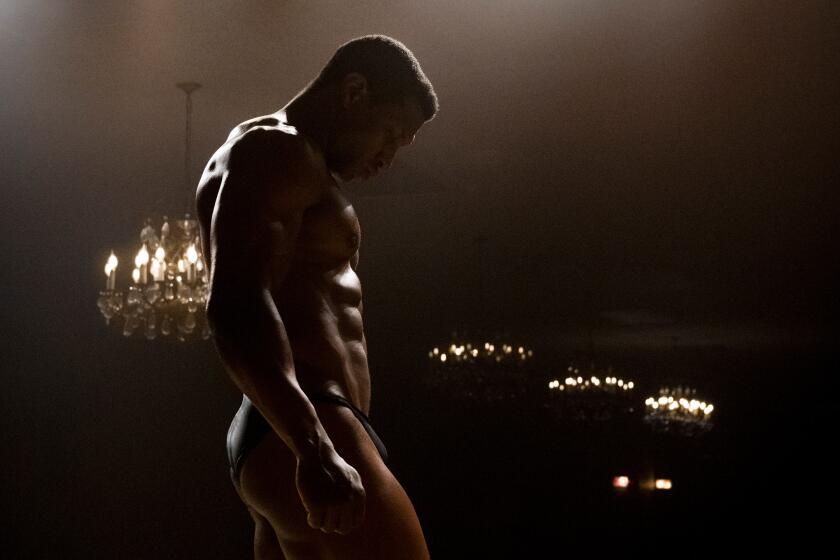Drama and Satire, All Popped Together
- Share via
It is seldom easy to parody subjects that, on their own, already teeter on the absurd. The mores of Hollywood--or, more precisely, the standard cliches about them--have to rank near the top of any group of such self-satires, and when these are crossed with a subject of such complexity as the relationship between movies and violence, the emerging hybrid requires an almost Shavian bravura of thought and language to bring off effectively.
Ben Elton’s “Popcorn” aims to do just that. A book that straddles three genres (satire, melodrama and ideological debate), the novel has its heart in a worthy and important place, but its head is at times overtaxed by the scale of the task.
Among the more notable ancestors on “Popcorn’s” family tree are Nathanael West’s “Day of the Locust,” the progenitor of the Hollywood novel; George Bernard Shaw’s “Major Barbara” as a model of bringing together unlikely characters and allowing them to thrash out a key issue of the day; and Paddy Chayefsky’s “Network” for its once prescient but now commonplace (and, incidentally, 21-year-old) indictment of the corrupt behavior of the media.
A cousin to Costa-Gravas’ recent “Mad City,” “Popcorn” displays its closest kinship not to the novel but to the screenplay with which it shares a reliance on dialogue, an emphasis on behavior over psychology and a technique of intercutting rapidly between different lines of action. In places “Popcorn” slips into actual script format as if in anticipation of the movie it clearly endeavors to become.
Bruce Delamitri is at the center of Elton’s satire, and he is not an easy man to like. A director of “tough, witty, sassy street-wise thrillers,” Delamitri is about to receive an Oscar for a movie called “Ordinary Americans.”
As he appears on a morning talk show and addresses a film class at USC, he is alternately glib, pugnacious and arrogant. He superciliously concedes that his work is popcorn, “but only if other popular and corny works like ‘Romeo and Juliet’ and Beethoven’s Fifth [are] popcorn too.”
When asked whether his movie is responsible for inspiring a barrage of killing committed by the media-named Mall Murderers, Delamitri offers the argument that artists don’t create society but reflect it. Clearly we are meant to believe that he is ripe for a fall--or an education, in any event.
The narrative alternates between Delamitri’s journey through his glittering Oscar night and the progress of Wayne and Scout, a “Bonnie and Clyde for the millennium” who murder their way to Delamitri’s Beverly Hills mansion.
Its most interesting interlude involves Delamitri and Brooke Daniels, an actress he picks up at the post-Oscar Governor’s Ball. Brooke plays Monroe to Delamitri’s Miller. She claims never to have seen “Ordinary Americans,” which the director promptly screens for her. They adjourn to his house, where Brooke shows Delamitri how a realistic sex scene should be staged. Then she takes a pistol out of her purse and threatens to kill him--all, it turns out, as an elaborate audition.
“Your pictures make people horny and scared. What did I just do to you?” she asks, having at once trumped, frightened and charmed the unsuspecting director.
Similarly suspenseful is Delamitri’s first introduction to Wayne and Scout, who venerate the director’s work. While initially rather a fierce pair, they quickly evolve into a kind of hydra-headed foil to the cocksure Delamitri: They set him straight on his technique, explaining that murder isn’t witty and usually takes place without music in the background, and they settle in for a long evening of violence and terror and a dissertation on both.
The foursome is eventually joined by Delamitri’s agent, ex-wife and daughter; a cameraman and sound engineer are sent in as the book nears its climax so that the killers and the chronicler of killers can engage in a televised debate about who is responsible for the unchecked violence on the streets--and movie screens--of America.
By this point, the book loses touch with any reasonable sense of reality, as a good satire is entitled to. But a satire must also earn its loopiness, and the trouble with “Popcorn” is that its attentions remain too deeply divided: Melodrama and satire are not particularly compatible bedmates. The more authorial and knowing Wayne and Scout turn, the more implausible both “Popcorn’s” violence and its thinking become.
While the novel contributes a few valuable kernels to a debate that is very much part of our cultural moment, they have not, unfortunately, been popped into a very believable batch.
More to Read
Only good movies
Get the Indie Focus newsletter, Mark Olsen's weekly guide to the world of cinema.
You may occasionally receive promotional content from the Los Angeles Times.










